|















©
2007-2025
Man From Mars Productions

|
| |
|
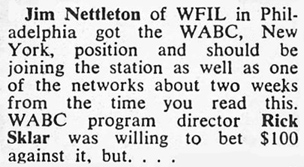
Billboard
magazine - September 27, 1969
|
Q:
You had a long run at WFIL before a two-year break at
WABC (1969-71). Somewhere in some early CSB material
they mentioned that you had a career goal of getting
to WABC. Was it all you expected?
A:
I have no idea where that came from, although I've heard
it many times over the years - most often from George
Michael who seemed to take great pleasure in proclaiming
that to all who would listen. I had no thought of leaving
WFIL until Julian Breen, then Rick Sklar's assistant,
contacted me in mid 1969. Even then, I turned down the
first offer they made which was for the all night show
- at that time, 6 hours. It was only when they came
back with an excellent package deal, which included
a network show on the Contemporary Network, that I accepted.
|
|
My
time at ABC and the network was good - and was all that
I expected. That was a terrific crew. Amazing that the
station covered 40 states at night and could be heard
in northern Europe.
Q:
In January 1972 you sent me a couple of DRC airchecks;
the letterhead was Cantaur Productions Limited, with
addresses in Cherry Hill, NJ and NYC. What was that
endeavor all about?
|
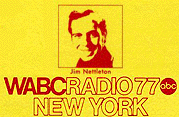
Jim
Nettleton
at WABC - 1969
|
A:
It was my production company at the time. I wrote, voiced
and produced long form specials for radio that were eventually
heard in 24 countries on over 2,000 radio stations around
the world. One of the specials was in collaboration with Long
John, using his interviews with the Beatles - it was called
Beatles: The Echoes And The Dream - it was a 6 hour
special examining their development and careers. Another was
The Rock Genesis, a 12 hour history of rock. A third
was The Rock Years, which was originally a 36 hour
affair counting down the top 20 songs of each year beginning
in 1955, along with information on fads and fashions of the
times, noteable news events and sports news. The fourth was
The History Of Country Music; The Sound Of America
- a 6 hour sepcial. All contained extensive interviews and
lots of music.
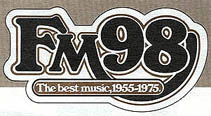 |
Q:
After some time in New York at WHN and WPIX FM, you
spent some time at CHUM in Toronto; how did that come
about?
A:
Bob Wood, who was PD at CHUM at the time contacted me.
They needed on air help at the time, since they were
shorthanded. I spent a year commuting up there doing
air work and also did some consultation. Almost went
to work for them full time toward the end of my association,
but although Toronto is a wonderful city, moving to
a new country is a major culture shock. In the end,
I decided not to. My stay there was wonderful - some
of the nicest people I've ever met and they treated
me superbly.
|
|
|
|
| |
Q:
You later had a long run at several Philadelphia stations. I think
you worked with LJW
again at WCAU FM. That
was an early example of a successful (partially) automated format.
A: Yes, it was
- under terribly difficult circumstances. I was doing things with
that system that it really wasn't designed to do. There were many
workarounds that needed to be literally invented - our chief engineer,
Bob Shields, was a pure genius - I'd tell him, "Bob, I need to do
this..." and he'd find a way. It was tough, but we made it work.
The equipment was truly primitive by today's standards. The main
music sources were several of the infamous Instacarts, that had
4 rows of 12 cartridge bays apiece - and each set of 12 cartridge
bays was powered by one common capstan - a recipe for disaster,
given the high rate of cartridge tear-ups. And tear up, they did
- frequently.
|
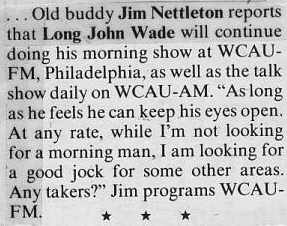
Billboard
magazine - March 16, 1974
|
|
| |
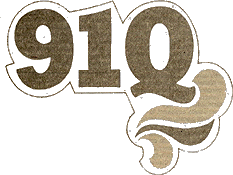
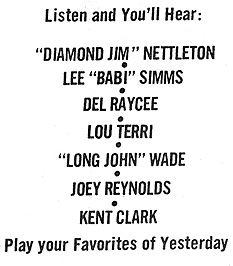
newspaper
ad - September 20, 1974
|
Q:
In September 1974 you did a show at the new WRCQ AM 910 (formerly
WRCH AM). You were among a handful of Hartford alumni who
returned to kick off the big debut. Did you get any negative
reaction from Charlie or the DRC brass? After all,
you were promoting new competition!
A: Not
at all. Charlie and the DRC
crew were much bigger than that. It was a fun time interacting
with some great people. Lee Manson, who was in charge there
at the time had been PD at WAVZ in New Haven during my short
time there. He was a very good man - it was a lot of fun doing
that weekend.
 Q: In August 1995 you were part of WDRC FM's 35th Anniversary
promotion, joining virtually all of the Friendly Five
and Swinging Six for a weekend celebration. Among other
things you recalled playing golf with Jim
Raynor. Any other memories of that weekend?
Q: In August 1995 you were part of WDRC FM's 35th Anniversary
promotion, joining virtually all of the Friendly Five
and Swinging Six for a weekend celebration. Among other
things you recalled playing golf with Jim
Raynor. Any other memories of that weekend?
A: That
was one of the most memorable times of my career. Unfortunately,
I had been booked to do a high school reunion long before
I learned of that event, so I had to drive up to Hartford
in the morning and leave to go back to Philly in the late
afternoon. I have always regretted that I didn't have more
time to spend that weekend - especially since that was the
last time I saw Ron
Landry, as I've mentioned before, one of the great talents
of the business.
Jim
Raynor and I were both passionate about golf and played
as much as we could together. We managed to scrape it around
pretty good in days gone by. Joe
Barbarette would play with us often. One of our frequent
companions was Dave Melody, a pro, who used to preside at
East Hartford, as I recall, then opened his own course - the
name escapes me - where we'd kick it around frequently.
I wished
I could have attended the show on that weekend - I know it
would have brought back memories of the great shows we had
at the Bushnell Auditorium in years gone by for the Danny
Thomas Teenager's March and the Big
D Big Shows as well.
Hopefully,
there'll be another reunion in the near future.
|
|
|
| |
Q:
As your career developed you developed a reputation as an oldies
expert which leads me to today - your on-line oldies station. Tell
us about that.
A: It's as much
a labor of love as anything else. It was born to a great extent
by extreme frustration over the state of oldies programming on radio
today. Also playing a part was the one year debacle at WPEN - an
oldies format that couldn't possibly have been done in a more disastrous
manner. I wanted to develop a format that not only played great
music that has been unceremoniously shoved to the back shelf by
today's broadcasters, but that also had a strong Philly flavor.
More than 64 name artists were born and brought up in a 16 square
block of South Philly - and no one, even in Philly, plays more than
a token sampling of their music. Thus, the internet radio station
was born. So far, reaction has been excellent and the numbers keep
rising. We have a few sponsors and expect to do better in that regard
shortly. There will never be a lot of ads - the overhead is fairly
low, so there don't have to be. I've got 3 other well-known Philly
personalities on air in Charlie Bennett, Kim Martin and Christy
Springfield. I'll be getting into special shows of different varieties
in the near future.
|
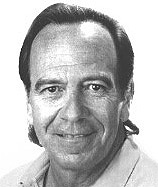
Jim
Nettleton in 2003
|
|
| |
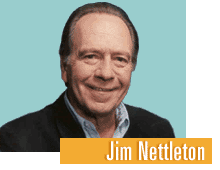 |
Q:
The days of music personalities on the radio seem gone forever.
Or do you think the pendulum might swing at some point and a whole
new generation will discover what personality radio in the 1960s
was all about?
A: I hope I'm
wrong, but I don't think so. With the proliferation of personal
music delivery systems, the future is probably going to be dominated
by those devices and not commercial radio. Commercial radio has
only itself to blame for what I think will be its ultimate demise.
You can drive coast to coast and hear exactly the same formats,
liners, station nicknames, etc. It's all research driven and presided
over by a bunch of no-soul-suits whose first mission in professional
life is safety, not imagination and invention. There's nobody out
there anymore with the courage to deviate or the intellectual capacity
and curiosity to experiment. As I said, I hope I'm wrong.
|
|
|
Jim
Nettleton passed away October 4, 2009 at the age of 69.
|
|









